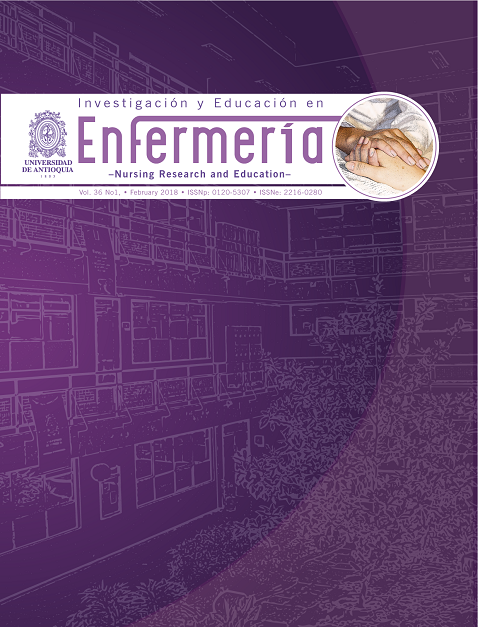The impact of chronic kidney disease: experiences of patients and relatives from the extreme north of Brazil
DOI:
https://doi.org/10.17533/udea.iee.v36n1e02Keywords:
Renal insufficiency, chronic, renal dialysis, qualitative research.Abstract
Objective. To identify the impact of chronic kidney disease on patients and their families.
Method. This is a qualitative study conducted by the theoretical and methodological reference of Symbolic Interactionism and Narrative Research. The scenario of the study was the State of Amapá, in the extreme north of Brazil. Semi-structured interviews were conducted with 15 patients who experienced hemodialysis therapy and 16 family members.
Results. The thematic analysis of the narratives resulted in the identification of two themes: life before the disease and life invaded by the disease.
Conclusion. The diagnosis of chronic kidney disease and the need undergo hemodialysis emerged as a source of intense suffering, affecting the daily lives of the families as a whole and causing physical, psychological and social damages.
How to cite this article: Mello MVFA, Angelo M. The impact of chronic kidney disease: experiences of patients and relatives from the extreme North of Brazil. Invest. Educ. Enferm. 2018; 36(2):e02.
Downloads
References
(1) Nugent RA, Fathima SF, Feigl AB, Chyung D. The Burden of Chronic Kidney Disease on Developing Nations: A 21st Century Challenge in Global Health. Nephron. Clin. Pract. 2011; 118:c269–c277.
(2) Bastos MG, Kirsztajn GM. Chronic kidney disease: importance of early diagnosis, immediate referral and structured interdisciplinary approach to improve outcomes in patients not yet on dialysis. J. Braz. Nefrol. 2011; 33(1):93-108.
(3) Retting RA. The social contract and treatment of permanent renal failure. J. Am. Med. Assoc. 1996; 274:1123-26.
(4) Jha V, Garcia-Garcia G, Iseki K, Li Z, Naicker S, Plattner B, et al. Chronic kidney disease: global dimension and perspectives. Lancet. 2013; 382:260-72
(5) Barreto MS, Marcon SS. Doença Renal Crônica: vivências e expectativas do cuidador. Rev. Enferm. UERJ. 2012; 20(3):374-9.
(6) Makaroff KS, Sheilds L, Molzahn A. Symbolic representations of living with chronic kidney disease. Nephrol. Nurs. J. 2013; 40(6):517-26.
(7) Bayhakki, Hatthakit U. Lived Experiences of Patients On Hemodialysis: A Meta-Synthesis. Nephrol. Nurs. J. 2012; 39(4):295-305.
(8) A, Henning P, Wong G, McTaggart S, Mackie F, Carroll R. et al. Experiences and Perspectives of Adolescents and Young Adults With Advanced CKD. Am. J. Kidney Dis. 2013; 61(3):375-84.
(9) Al-Ghabeesh S, Suleiman K. The Lived Experience of Patientes with End Stage Renal Disease on Hemodialysis: A Phenomelogical Study. Int. J. Med. Med. Sci. 2014; 47(1):1423-29.
(10) Denzin NK, Lincoln YS. Introduction: The discipline and practice of qualitative research. In: Denzin NK, Lincoln YS, Editors. The Sage handbook of qualitative research. 4th ed. Thousand Oaks, CA: Sage; 2011; P.1-19.
(11) Blumer H. Simbolic interactionism: perspective and method. Berkeley: University of California; 1969.
(12) Clandinin DJ, Connelly FM. Narrative inquiry: experience and story in qualitative research. San Francisco: Jossey- Bass; 2000.
(13) Instituto Brasileiro de Geografía e Estatística. Estimativa de população; 2017 [cited 3 Oct 2017]. Available from: http://ibge.gov.br/estadosat/perfil.php?sigla=ap
(14) Wright LM, Leahey M. Enfermeiras e famílias: um guia para a avaliação e intervenção na família. São Paulo, 5th ed. Roca; 2012.
(15) Leonidas C, Santos MA. Relações familiares nos transtornos alimentares: o Genograma como instrumento de investigação. Cien. Saude Colet. 2015; 20(5):1435-47.
(16) Braun V, Clarke V. Using thematic analysis in psychology. Qual. Res. Psychol. 2006; 3(2):77-101.
(17) Morin EM. Os sentidos do trabalho. RAE - Revista de Administração de Empresas. 2001; 41(3):8-19.
(18) Lourenço CDS, Ferreira PA, Brito MJ. O significado do trabalho para uma executiva: a dicotomia prazer e sofrimento. Organizações em contexto. 2013; 9(17):247-79.
(19) Rotenberg L, Griep RH, Fischer FM, Fonseca MJ, Landsbergis P. Working at night and work ability among nursing personnel: when precarious employment makes the difference. Int. Arch. Occup. Environ. Health. 2009; 82(7):877-85.
(20) Starfield B. Atenção primária: equilíbrio entre necessidades de saúde, serviços e tecnologia. Brasília: UNESCO; 2002.
(21) Walsh F. Fortalecendo a resiliência familiar. São Paulo: Roca, 2005.
(22) Rudnicki, T. Doença renal crônica: vivência do paciente em tratamento de hemodiálise. Contextos Clínic. 2014; 7(1): 105-16.
(23) Bertolin DC, Pace AE, Kusumota L, Haas V. An association between forms of coping and the socio-demographic variables of people on chronic hemodialysis. Rev. Esc. Enferm. USP. 2011; 45(5):1070-76.
(24) Alnazly EK. Burden and coping strategies among Jordanian caregivers of patients undergoing hemodialysis. Hemodial. Int. 2016; 20:84-93.
(25) Velázquez PY, Espín AM. Repercusión psicosocial y carga en el cuidador informal de personas con insuficiencia renal crónica terminal. Rev. Cubana Salud Pública. 2014; 40(1):3-17.
Downloads
Published
How to Cite
Issue
Section
License
Derechos de propiedad / Direitos de Propriedade
English: If the article is accepted for publication, all copyright will be of exclusive property of Investigación y Educación en Enfermería. The text and the graphics included in the publication are exclusive responsibility of the authors and not necessarily reflect the thought of the Editorial Committee.
Español: Si el artículo es aprobado para publicación, todos los derechos son de propiedad de Investigación y Educación en Enfermería. El texto y las gráficas incluidas en la publicación son de exclusiva responsabilidad de los autores y no necesariamente refleja el pensamiento del Comité Editorial.
Português: Se o artigo for aceito para publicação, todos os direitos autorais serão de propriedade exclusiva de Investigación y Educación en Enfermería. O texto e os gráficos incluídos na publicação são de responsabilidade exclusiva dos autores e não refletem necessariamente o pensamento do Comitê Editorial.















